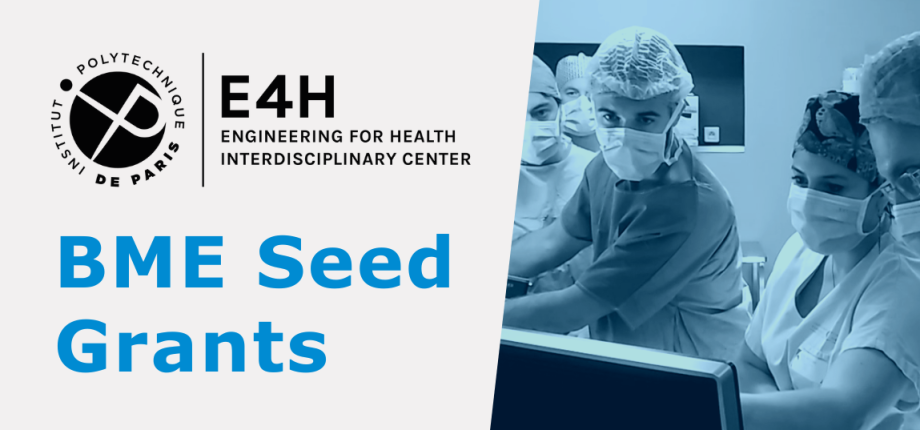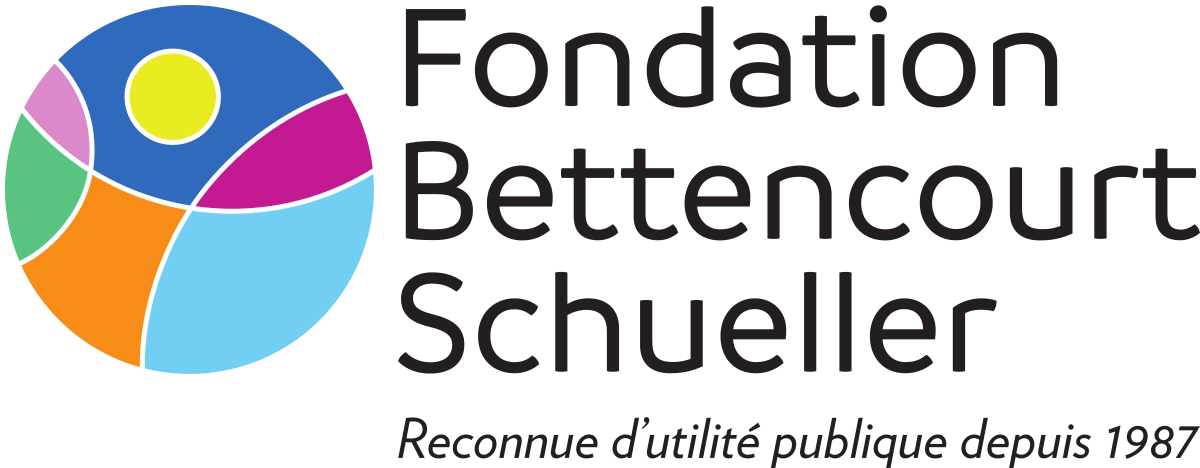Biomedical Engineering Seed Grants Program


The Engineering for Health (E4H) interdisciplinary center of Institut Polytechnique de Paris announces the 3rd call for proposals for its Biomedical Engineering Seed Grant Program funded by the Fondation Bettencourt Schueller.
This program provides seed funding for novel biomedical engineering research projects focused on the development of new collaborations between faculty members and medical doctors. The present call is open to faculty members from Institut Polytechnique de Paris and Université Paris-Saclay. These seed grants are expected to allow the awardees to generate the necessary preliminary results needed to apply for follow-up funding from other national and/or international sources or to obtain proof-of-principle results for launching technology transfer activities.
The present call is expected to lead to the funding of 5 seed grants. This is the final call of the current edition of the program, and no additional calls will be issued during the period 2023-2025.
Award Size and Duration
Each successful seed grant will have a duration of 2 years and a budget of €70,000 per year for a total amount of €140,000. The funds are expected to be used primarily for funding a 2 year contract for a postdoctoral fellow or a research engineer. The purchase of small equipment and consumables related to the proposed research is also permitted, as are project-related travel, publication, and research intern costs. Year 2 funding will be contingent on the demonstration of satisfactory progress in Year 1 as well as the presentation of the project at the E4H Annual Symposium.
Application Procedure
Each project must have a single principal investigator (PI) from either Institut Polytechnique de Paris or Université Paris Saclay and a medical doctor as a co-investigator (co-I). The collaborating medical doctor may be based anywhere in France. Additional project partners, including members of the private/innovation sector, are allowed. The PI will be responsible for the overall conduct of the project, and the award will be made to the research laboratory with which he/she is affiliated.
The application, written in English, consists of the following:
- A cover page that provides the title of the project, the names and affiliations of the project investigators, and up to five keywords. (1 page)
- A research project that describes the scientific scope, defines a set of specific aims that can be accomplished over a period of two years, and details the proposed methodology. The novelty of the proposed research needs to be clearly described. (maximum 4 pages) • Bibliography (maximum 2 pages)
- Description of the envisioned societal impact of the project (maximum 1 page)
- Project timeline and perspectives for follow-up funding and/or technology transfer activities (maximum 1 page)
- Plans for public dissemination and/or outreach activities (maximum 1 page)
- Biographical sketches including latest publications and technology transfer activities of the project partners (and the postdoctoral fellow(s)/research engineer(s) who will work on the project if known at the time of application) as well as information about their teams and available resources (maximum 2 pages per biographical sketch)
- Ethics/animal welfare committee approval (or concrete plans for submitting applications for approval) for projects involving animal studies
- Project budget including detailed justification of all anticipated expenditures (maximum of €70,000 per year for a maximum total of €140,000 over the two-year period)
- A statement attesting that the proposed project is not funded simultaneously by another source.
Projects that do not adhere strictly to the above instructions and page limits will be penalized.
Application Submission Procedure and Timeline
Applications should be submitted electronically as a single PDF file uploaded on the following application form: Submit your application here
Applications must be submitted by 11:59 p.m. CEST (Central European Summer Time), Tuesday April 18, 2023. Late applications will not be accepted and will be returned to the applicant.
Funding decisions are expected in early July 2023. All projects are expected to start no later than January 1st, 2024; therefore, it is mandatory for the recruited postdoctoral fellow or research engineer to be in place by that date. A delay in the start of the project is likely to result in partial or total loss of funding. No expenditures can be made after December 31, 2025.
Evaluation Procedure and Selection Criteria
Project evaluations and award decisions will be made by an international Scientific Council external to Institut Polytechnique de Paris and Université Paris-Saclay. Project selection will be based primarily on the scientific excellence of the proposed project and the potential impact of the work as evaluated by the Scientific Council. High-risk, high-reward projects are particularly encouraged. The possibility of technology transfer activities that hold promise for improving patient lives will be viewed especially favorably.
The Scientific Council will initially short-list the top projects. Short-listed projects will be invited to make an oral presentation to the Scientific Council in order to determine the final laureates. The oral presentations will take place at the end of June 2023, and both the project PI and co-I must be present. The detailed modalities of the oral presentations will be announced in early June 2023. The official announcement of the laureates will be made in early July 2023.
The progress of the project will be assessed in a mid-term evaluation that takes the form of an oral presentation to the Scientific Council to be held in September 2024. Funding for Year 2 is contingent on a favorable outcome of this mid-term evaluation. The PI, Co-I, and recruited postdoctoral fellow or research engineer are expected to all be present at the mid-term evaluation.
For further information, please contact Silvia Corsini: silvia.corsini@polytechnique.edu
Download the PDF of the Biomedical Engineering Seed Grants 2023 Call
Grants Laureats
- Kidney PERFusion mapping by ultrafast UltraSound Imaging for noninvasive diagnosis Of chronic Nephropathy (PERFusion)
- Jean-Luc Gennisson, IR4M (Université Paris-Saclay)
- Jean-Michel Correas, Service de Radiologie Adulte (Hôpital Necker, AP-HP)
- Mechanical Probing of tumor infiltrating lymphocytes
- Julien Husson, LadHyX (IP Paris)
- Emanuela Romano, Center for Cancer Immunotherapy (Institut Curie)
- Multiscale characterization of myelin organization in healthy and multiple sclerotic brain tissues using third-harmonic microscopy (Brain Harmonics)
- Emmanuel Beaurepaire and Chiara Stringari LOB (IP Paris)
- Bruno Stankoff (Institut du Cerveau et de la Moelle épinière, AP-HP)
- Nuclear Caging in Vascular Endothelial Cells
- Abdul Barakat, LadHyX (IP Paris)
- Catherine Coirault, Institut de Myologie (Hôpital Pitié-Salpêtrière, AP-HP)
- NAnoparticle-based ultra-Sensitive fast COVID detection Assay (NASCA)
- Cedric Bouzigues, LOB (IP Paris)
- Bruno Lina, Laboratoire Virpath (Université de Lyon), Laboratoire de Virologie (Hôpital de la Croix-Rousse, HCL)
- Microfluidic Selection of Ovocytes for Assisted Reproductive Technologies (MicrOART)
- Clément Campillo, LAMBE (Université Paris-Saclay)
- Elsa Labrune, Service de médecine de la reproduction (Hôpital Femme Mère Enfant, HCL)
- Benoit Schneider, as first ingestigator, and David Devos, as co-investigator, for the project: Targeting PDK1 kinase to calm inflammation in Amyotrophic Lateral Sclerosis: towards new therapeutic strategies
- Julien Nicolas, as first ingestigator, and Julien Stirnemann, as co-investigator, for the project: Development of Injectable Polymer Prodrug Assemblies for the Intrauterine Treatment of Congenital Cytomegalovirus Infection
- Willy Supatto, as first ingestigator, and Virginie Lambert, as co-investigator, for the project: MINIHEART PROJECT: An all-optical strategy for live imaging and manipulation of human cardioids to investigate cardiac regeneration after injury
- Irène Vignon-Clementel, as first ingestigator, and Pablo Bartolucci, as co-investigator, for the project: Impact of hemodynamics shear forces on sickle cell disease-related cerebral vasculopathy development
- Jing-Rebecca Li, as first ingestigator, and Anne Kerbrat, as co-investigator, for the project: Investigation of potential biomarkers to detect chronic inflammation in Multiple Sclerosis through diffusion MRI














